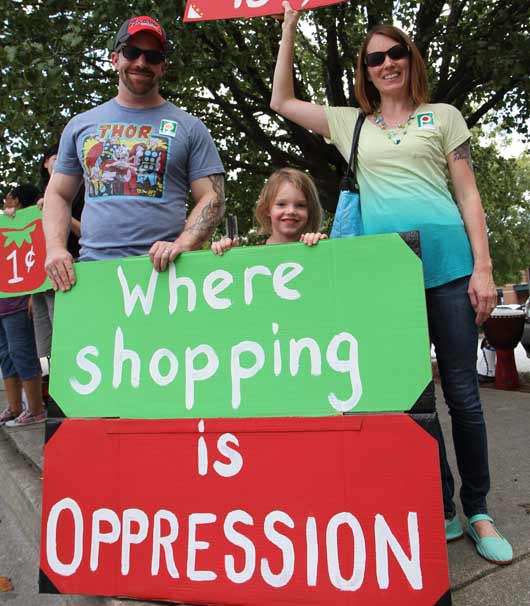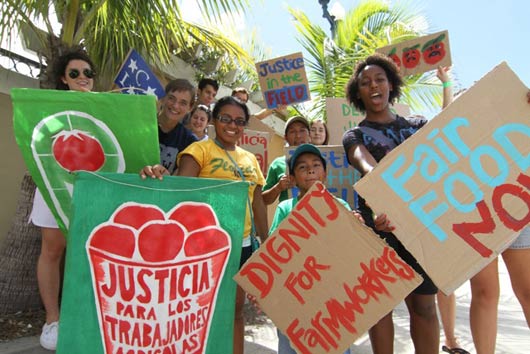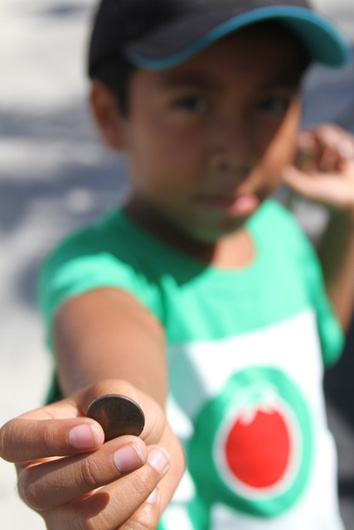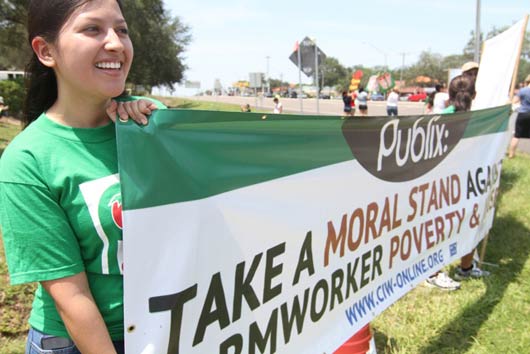
Multiple Labor Day protests marked by increasingly harsh tactics from Publix’s anti-Fair Food response team…
Labor Day is the one time each year we stop to recognize the contributions of workers to the country’s long history of economic prosperity and social progress. And what better way to celebrate than to stand with farmworkers from Immokalee in the Campaign for Fair Food, the growing movement to bring farmworkers in from the margins of society, where they have toiled for generations in grinding poverty, to share in the prosperity they have created with their undervalued labor?
Well, hundreds of consumers did just that this Labor Day weekend, joining farmworkers at Publix protests and manager letter delegations from Sarasota, Florida, to Knoxville, Tennessee, and nearly two dozen cities in between. The picture at the top of this post is from Atlanta; the picture immediately below is from a lively protest of Fair Food activists and workers in Sarasota.

But not everyone at the protests was in a celebratory mood. Publix’s omnipresent anti-Fair Food response team — the small cadre of men who, among other things, have conducted an often disturbing surveillance program since the first days of the Publix campaign, including going undercover to film CIW members’ children at early protests — were at their most bitter this weekend, harassing protesters with every trick in the book, from calling tow trucks to haul off consumers’ cars to calling the police on a Presbyterian pastor who entered a store after the Sarasota protest to order a sandwich and instead was threatened with arrest and handed an order banning him from the store for a year.
But if the Publix protest surveillance squad had a favorite tactic this weekend, it had to be aggressively demanding that the religious and student allies “Name one grower who isn’t paying minimum wage.” The question — posed pugnaciously as if just by asking it with enough misplaced bravado the long and well-documented history of rampant violations of minimum wage violations in the fields would somehow magically disappear — is just so wrong that it is hard to know where to begin in addressing it.
First, the question is a remarkably brazen attempt to make a virtue out of Publix’s own ignorance.
The entire premise of the Fair Food Program is to establish channels of communication (including a complaint system and a regular audit process) among workers, growers, and buyers to identify and eliminate the longstanding abuses that have plagued farm labor for generations, for the good of the industry as a whole. As part of the Program, if Code violations are found and a grower refuses to correct them, including minimum wage violations, then that grower is removed from the program and participating buyers are informed immediately, so that they can suspend purchases from the grower in question.
 But Publix has refused to participate in the Fair Food Program, and so isn’t informed when growers are removed from the Program. Instead of working in partnership with the Fair Food Standards Council, the very people who do the audits and can provide the answer to its question, Publix prefers to bully students and people of faith, who may not know the answer but do know that Publix isn’t doing its part to end human rights violations in its supply chain.
But Publix has refused to participate in the Fair Food Program, and so isn’t informed when growers are removed from the Program. Instead of working in partnership with the Fair Food Standards Council, the very people who do the audits and can provide the answer to its question, Publix prefers to bully students and people of faith, who may not know the answer but do know that Publix isn’t doing its part to end human rights violations in its supply chain.
[A note to Publix: Pestering protesters for names of growers who don’t pay minimum wage when you know they can’t give you an answer is the height of false courage. It does no one any good. Instead, you could show some real courage, and character, by joining the Fair Food Program. Then you would have all the information you might want. Problem solved.]
Second, the Penny per Pound premium that is the centerpiece of the Fair Food Program is designed to prevent minimum wage violations before they happen, not simply close the barn door once the horse is long gone.
Piece rates in the Florida tomato industry have remained virtually stagnant for more than 30 years, and workers are all too often not credited with all the hours they put in. As a result, a significant percentage of workers consistently earn below minimum wage, while another large portion hover forever on the very edge of falling below the minimum. The Penny per Pound allows growers to pay workers more, lifting many workers out of the danger zone and solving the problem at its root. But Publix refuses to pay the penny and do its part to help end minimum wage violations, instead preferring to stick its head in the sand and blindly proclaim there are no violations.
Finally, when the CIW did inform Publix that the last major slavery prosecution involved farms in its supply chain, Publix did nothing for months and instead revealed what is apparently their true position: “If there are some atrocities going on, it’s not our business.”
Publix can’t have it both ways. It can’t demand to know which farms aren’t paying minimum wage, implying that the company would take swift action if it were informed of violations, while simultaneously taking the position that “it’s not our business” when informed of minimum wage violations — and forced labor — in its supply chain. Those are two logically, not to mention morally, contradictory positions. But if you want to know the company’s real position, watch what it does, not what it says. At every step of the way, Publix’s actions, and inactions, have spoken far louder than its words.
But let’s not let the Publix surveillance squad’s bad day color what was otherwise a wonderful weekend of action. Let’s close, instead, on a positive note, with this great picture from a protest of nearly 100 workers and Fair Food activists in Tampa:

And with a media round-up from the weekend’s actions:
- “Consumers to Picket Outside Publix for Refusal to Join Fair Food Program,” West Orlando News, 8/31/12
- “Protest planned over tomato pickers’ pay at local Publix,” Orlando Sentinel, 8/31/12
- “Dozens of activists demonstrate outside Publix,” Knoxville, TN, NBC-WBIR, 9/2/12
- “Farm workers picket Publix over tomato-picker wages,” Tampa Bay Online, 9/3/12
And be sure to check back again this week for a number of excellent Op/Eds on the Fair Food Program that ran in several papers this Labor Day weekend — including one by our friends at the International Justice Mission that ran in the august pages of the Washington Post!
